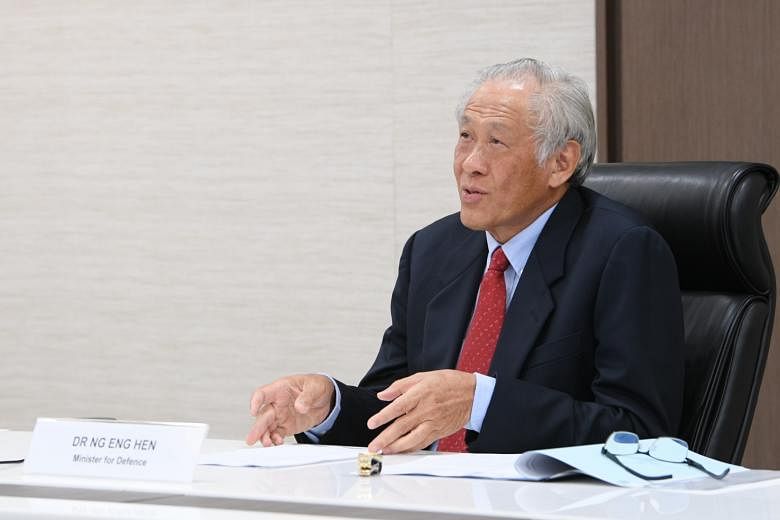SINGAPORE - There is too much at stake for Europe for it to ignore the Asia-Pacific, but it must ask itself how far it is willing to go in imposing its own value systems on Asian countries when working with them, Defence Minister Ng Eng Hen said on Monday (Nov 22).
Europe has had more time than Asian countries to become what it is today, he said at an international conference, titled "Shaping The Future Together? Europe and the Indo-Pacific in the 21st Century".
He urged it to instead focus on other positive avenues for relationship building, such as student exchange, the rules of globalisation, science and technology and international trade.
"In ideological terms, European countries have had centuries to contest ideas, evolve and transform through many epochal events in global history... Meanwhile most Asian countries are new democracies.
"While there may be occasions where moral and ethical standards are called for (in mutual engagement), the question is not if, but to what extent, and to what end?" he said.
Dr Ng was speaking virtually to more than 40 politicians, policymakers and academics from both continents at the 177th Bergedorf Round Table. Those who attended included representatives of the European Union, China, the United States, Britain, India and Russia.
The Round Table, organised by non-profit organisation Korber Stiftung, is a high-level platform once described by the late president of West Germany Richard von Weizsacker as a "training camp for all who are prepared to cross the boundaries of their own discipline, political party and interests in order to learn by confronting the different experiences and perspectives of others".
In his remarks, Dr Ng referred to China and Myanmar, both of which have come under criticism and sanctions from the West for their attitude towards human rights.
China's crackdown on Hong Kong, its abuses in Xinjiang and, most recently, the alleged censorship of tennis player Peng Shuai, have generated controversy, while Myanmar's killing of Rohingya Muslims and the subversion of democratic norms by the military junta have led to calls for boycott.
Dr Ng said that unlike European countries, which have been through great upheavals, including the Protestant Reformation, the French Revolution and two world wars, Myanmar became independent only in 1948, while China took its modern republican form only in 1912.
He said China has set itself two centennial goals. The first, to "build a moderately prosperous society in all respects", has been achieved this year, he said.
The second focuses more on social concerns - towards "a modern socialist country that is prosperous, strong, democratic, culturally advanced and harmonious".
"President Xi Jinping has set the second goal to be achieved in the centenary of the founding of the People's Republic of China in 2049," he said.
He then turned his attention to the positive avenues for more productive collaboration between the East and West, "of which there are quite a few".
First, people-to-people ties through exchange, particularly students.
Dr Ng noted that Mr Xi, who had spent time in Iowa to study agricultural techniques as a young man, had 27 years later visited a family he was attached to when he visited the United States, showing "how powerful the formative experiences of our young in a foreign land" can be.
"Europe may also benefit in a similar fashion by expanding the reach of its educational programmes in order to attract their unfair share of Asia's best and brightest," he said.
The Ministry of Defence later clarified that by "unfair", Dr Ng was referring to the disproportionate number of Asian students who choose to pursue their studies in European institutions.
Problems of globalisation in the 21st century also need to be tackled urgently together, from wealth inequality and climate change, to "unfair trade practices like state subsidies, product dumping", he added.
"Europe can, together with the Asia-Pacific, shape more equitable new rules for Globalisation 2.0 - one that is more in tune with the zeitgeist of the 21st century and the millennials, which include responsible institutional and corporate citizenry."
The other two areas of positive collaboration Dr Ng mentioned are international trade and creating ethical bounds for new technologies.
Approximately 60 per cent of world trade now passes through Asia and 30 per cent of it goes through the South China Sea. In 20 years, Asia is expected to account for 50 per cent of global gross domestic product and drive 40 per cent of global consumption.
Last year, Asia accounted for two-thirds of all patent applications worldwide.
"Europe cannot afford to be on the sidelines in this phase of Asia-Pacific's history - it must play a central role as there is too much at stake for Europe and the Western world," Dr Ng said.
The basis of engagement cannot be "domination, forced access to natural resources or markets that Europe lacks", as was the case in the past.
"That is clear to all of us."


